
The nativity of Jesus, nativity of Christ, birth of Jesus or birth of Christ is documented in the biblical gospels of Luke and Matthew. The two accounts agree that Jesus was born in Bethlehem, Judaea, that his mother, Mary, was engaged to a man named Joseph, who was descended from King David and was not his biological father, and that his birth was caused by divine intervention. Some scholars do not see the two canonical gospel nativity stories as historically factual since they present clashing accounts and irreconcilable genealogies. The secular history of the time does not synchronize with the narratives of the birth and early childhood of Jesus in the two gospels. Some view the question of historicity as secondary, given that gospels were primarily written as theological documents rather than chronological timelines.
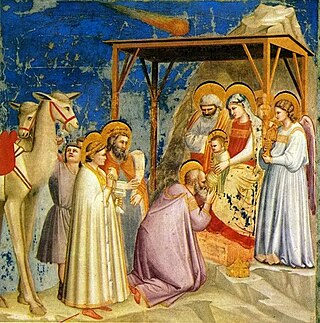
The Star of Bethlehem, or Christmas Star, appears in the nativity story of the Gospel of Matthew chapter 2 where "wise men from the East" (Magi) are inspired by the star to travel to Jerusalem. There, they meet King Herod of Judea, and ask him:
Where is He who has been born King of the Jews? For we have seen His star in the East and have come to worship Him.
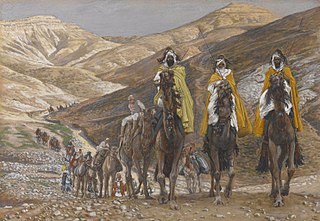
Matthew 2:1 is the first verse of the second chapter of the Gospel of Matthew in the New Testament. The previous verse ends with Jesus being named by his father. This verse marks the clear start of a new narrative, although the use of a quotation from Isaiah 7:14 in Matthew 1:23 is also reflected in the use of four Old Testament quotations in chapter 2.

Matthew 2:2 is the second verse of the second chapter of the Gospel of Matthew in the New Testament. The magi travelling from the east have arrived at the court of King Herod in Jerusalem and in this verse inform him of their purpose.

Matthew 2:3 is the third verse of the second chapter of the Gospel of Matthew in the New Testament. In the previous verse the magi had informed King Herod that they had seen portents showing the birth of the King of the Jews. In this verse he reacts to this news.

Matthew 2:4 is the fourth verse of the second chapter of the Gospel of Matthew in the New Testament. The magi have informed King Herod that they had seen portents showing the birth of the King of the Jews. In this verse he calls together leading figures of Jerusalem to find out where Jesus was to be born.
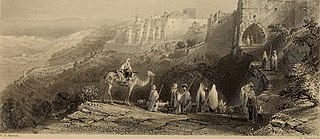
Matthew 2:6 is the sixth verse of the second chapter of the Gospel of Matthew in the New Testament. The magi have informed King Herod that they had seen portents showing the birth of the King of the Jews. Herod has asked the leading Jewish religious figures about how to find out where Jesus was to be born. In this verse they tell him by quoting from the Book of Micah.
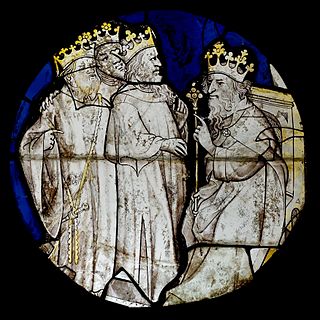
Matthew 2:7 is the seventh verse of the second chapter of the Gospel of Matthew in the New Testament. The magi have informed King Herod that they had seen portents showing the birth of the King of the Jews. Herod has consulted with the leading Jewish religious figures who reported he was to be born in Bethlehem. In this verse Herod again questions the magi.
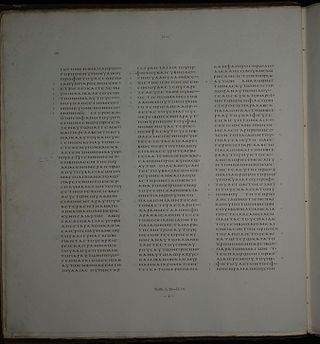
Matthew 2 is the second chapter of the Gospel of Matthew in the New Testament. It describes the events after the birth of Jesus, the visit of the magi and the attempt by King Herod to kill the infant messiah, Joseph and his family's flight into Egypt, and their later return to live in Israel, settling in Nazareth.

Matthew 2:8 is the eighth verse of the second chapter of the Gospel of Matthew in the New Testament. The magi have informed King Herod that they had seen portents showing the birth of the King of the Jews. After consulting with the leading Jewish religious figures Herod sends the magi to find the infant.

Matthew 2:9 is the ninth verse of the second chapter of the Gospel of Matthew in the New Testament. King Herod has dispatched the magi to Bethlehem to find the infant Jesus. In this verse they follow the Star of Bethlehem to find the infant.

Matthew 2:10 is the tenth verse of the second chapter of the Gospel of Matthew in the New Testament. The magi, dispatched by King Herod, have been shown the location of the infant Jesus by the Star of Bethlehem. In this verse they react to this.

Matthew 2:12 is the twelfth verse of the second chapter of the Gospel of Matthew in the New Testament. The magi, dispatched by King Herod, have found and paid homage to the Infant Jesus. In this verse this they return home rather than to Herod.

Matthew 2:14 is the fourteenth verse of the second chapter of the Gospel of Matthew in the New Testament. Joseph has been warned in a dream that he must flee to Egypt to escape the wrath of King Herod. An event known as the Flight into Egypt.
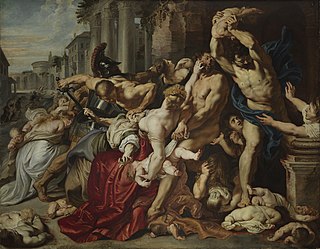
Matthew 2:16 is the sixteenth verse of the second chapter of the Gospel of Matthew in the New Testament.

Matthew 2:17 is the seventeenth verse of the second chapter of the Gospel of Matthew in the New Testament. Herod has ordered the Massacre of the Innocents and this verse links this event to a quotation from the Old Testament.
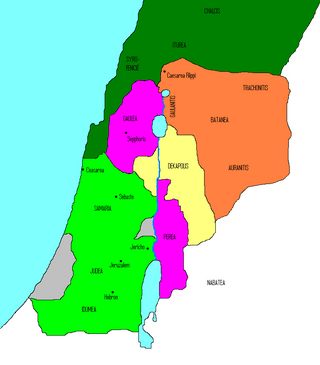
Matthew 2:22 is the twenty-second verse of the second chapter of the Gospel of Matthew in the New Testament. The young Jesus and the Holy Family have just left Egypt after hearing of the death of King Herod.
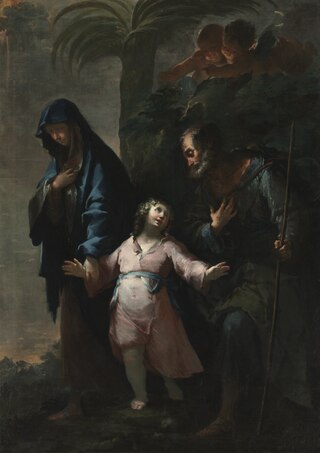
Matthew 2:23 is the twenty-third verse of the second chapter of the Gospel of Matthew in the New Testament. The young Jesus and the Holy Family have just returned from Egypt and in this verse are said to settle in Nazareth. This is the final verse of Matthew's infancy narrative.

The flight into Egypt is a story recounted in the Gospel of Matthew and in New Testament apocrypha. Soon after the visit by the Magi, an angel appeared to Joseph in a dream telling him to flee to Egypt with Mary and the infant Jesus since King Herod would seek the child to kill him. The episode is frequently shown in art, as the final episode of the Nativity of Jesus in art, and was a common component in cycles of the Life of the Virgin as well as the Life of Christ. Within the narrative tradition, iconic representation of the "Rest on the Flight into Egypt" developed after the 14th century.

The return of the family of Jesus to Nazareth, also known as the return from Egypt, appears in the reports of the early life of Jesus given in the canonical gospels. Both of the gospels which describe the nativity of Jesus agree that he was born in Bethlehem and then later moved with his family to live in Nazareth. The Gospel of Matthew describes how Joseph, Mary, and Jesus went to Egypt to escape from Herod the Great's slaughter of the baby boys in Bethlehem. Matthew does not mention Nazareth as being the previous home of Joseph and Mary; he says that Joseph was afraid to go to Judea because Herod Archelaus was ruling there and so the family went to Nazareth instead. The Gospel of Luke, on the other hand, does not record the flight to Egypt, and says that Joseph had been previously living in Nazareth, and returned there after the Presentation of Jesus at the Temple.



















